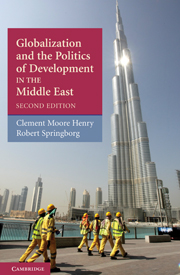Book contents
- Frontmatter
- Contents
- Figures
- Tables
- Preface to the second edition
- Preface and acknowledgments
- Glossary
- Map The Middle East and North Africa
- 1 The globalization dialectic
- 2 The challenges of globalization
- 3 Political capacities and local capital
- 4 Bunker states
- 5 Bully praetorian states
- 6 Globalizing monarchies
- 7 Precarious democracies
- 8 Conclusion
- References
- Index
3 - Political capacities and local capital
Published online by Cambridge University Press: 05 June 2012
- Frontmatter
- Contents
- Figures
- Tables
- Preface to the second edition
- Preface and acknowledgments
- Glossary
- Map The Middle East and North Africa
- 1 The globalization dialectic
- 2 The challenges of globalization
- 3 Political capacities and local capital
- 4 Bunker states
- 5 Bully praetorian states
- 6 Globalizing monarchies
- 7 Precarious democracies
- 8 Conclusion
- References
- Index
Summary
A state is supposed to be strong and nimble to take full advantage of the accelerated flows of capital, goods, and information associated with the post–Cold War surge of globalization, but few states in the MENA seem to be in the running. Perceived or imagined threats to their survival hobble and tangle a number of them in mushrooming security bureaucracies. Structural adjustment and the rise of political Islam and various ethnic identities have taken their toll, rendering many incumbent regimes ever clumsier, more repressive, and burdened with ever higher costs of police and military establishments. So much so that a representative group of Arab intellectuals issued the Arab Human Development Report 2002 sparking widespread debate about an alleged “freedom deficit” that was preventing any sustained development in the region. And in Iran, record urban crowds – reminiscent of the massive serial demonstrations leading to the 1979 revolution – protested the irregularities of the June 12, 2009, presidential elections. Indeed, if the World Bank's Voice and Accountability indicator, as reported in Figure 3.1, is a fair measure of the freedom deficit, the region's regimes on average scored lower in 1998 and worse in 2008 than those of any other region except the former Soviet Union, which had helped to shape a number of them to its obsolete security specifications.
This chapter tries independently to compare the capacities of the MENA regimes to mobilize resources efficiently and effectively for sustainable development in response to the challenges of globalization. To recall from Chapter 1, MENA polities consist of three major types – praetorian republics, monarchies, and, last, democracies of varying degrees of institutionalized competitiveness. Each category is in turn composed of subtypes. Praetorian republics are either “bunker” or “bully” states. Praetorian republics ruled by “bullies” have some elements of both civil society and rational-legal legitimacy, which in turn reduce, but do not altogether eliminate, the importance of violence and coercion in political life. The structural power of local capital, although negligible in praetorian republics governed by bullies, is noticeably greater than in bunker states, where security of property is insufficient to permit capital accumulation in the home country. Consequently the “bully” responses to economic globalization are less brutal than those of the bunkers. The limited capacities of the “bully” states, however, and the structural weakness of capital within them, to say nothing of their own political power requirements, have severely constrained their efforts to globalize. Egypt, Tunisia, and post-2005 Iran – after hardliners engineered the election of President Mahmoud Ahmedinejad – comprise the “bully” states of the MENA, whereas Algeria, Iraq, Libya, Sudan, Syria, and Yemen are the bunker states.
- Type
- Chapter
- Information
- Publisher: Cambridge University PressPrint publication year: 2010

